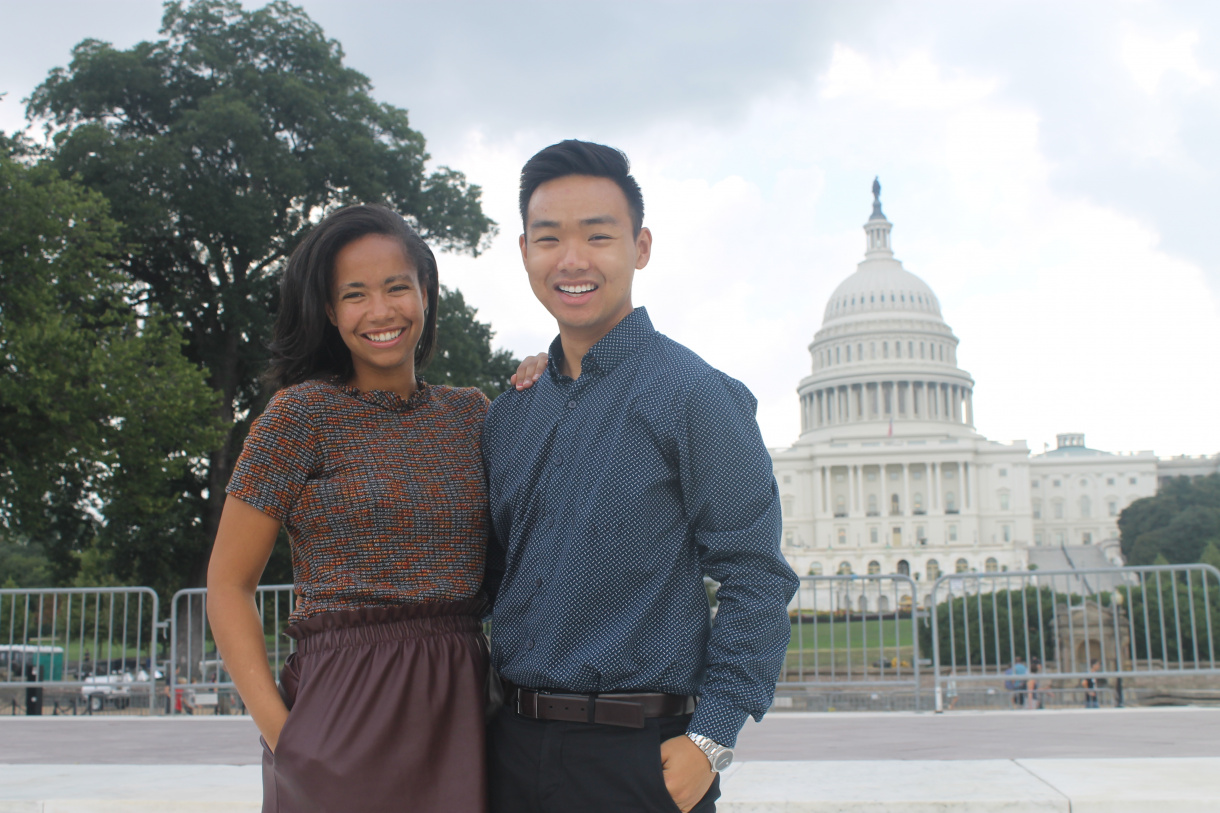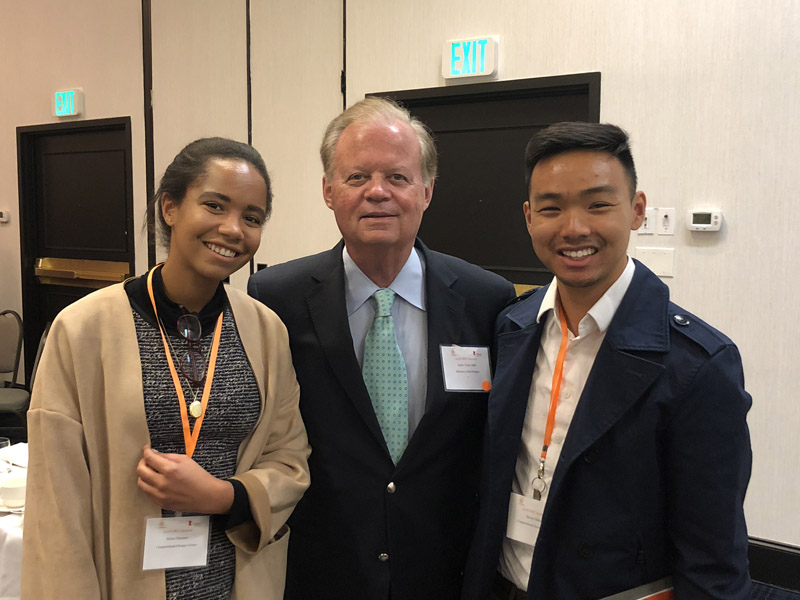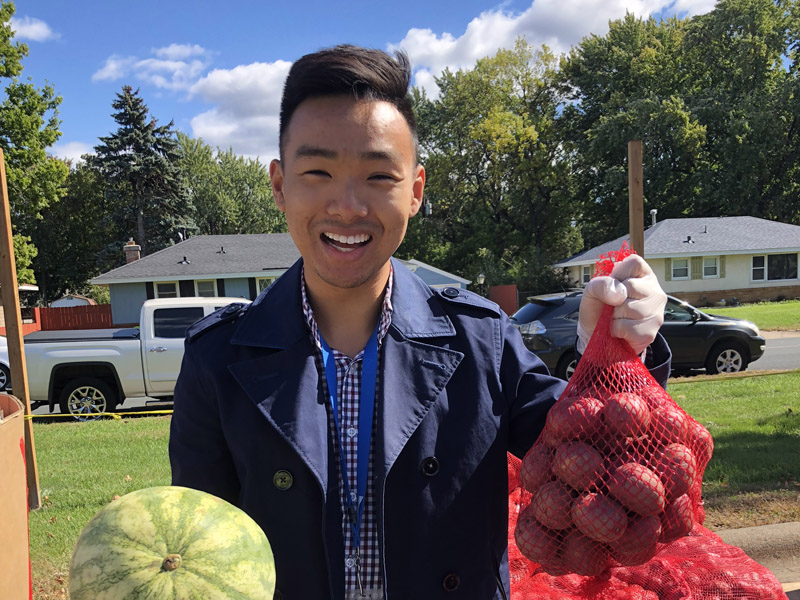The Twin Cities of Minneapolis and Saint Paul are the most populous cities in the state of Minnesota and combined form the third-largest metropolitan area in the American Midwest. Kiese Hansen and Davis Chhoa are the latest Emerson Hunger Fellows to travel to the North Star State; they are placed with Greater Twin Cities United Way and CAPI USA, both partnering with the Emerson Program for the first time. Read on to see how they are working with their host sites to both address the immediate needs of community members and to improve the underlying conditions causing hunger in the region.

Emerson Fellows Kiese Hansen (left) and Davis Chhoa in Washington, D.C., August 2018
Kiese Hansen
I applied to be a Bill Emerson National Hunger Fellow because I wanted to better understand the nuances of food insecurity in the U.S. and the language used to describe the issue. I have always been drawn to communications and messaging and through the fellowship, I hoped to gain more insight on a series of questions: What messages and strategies are being used to describe hunger in the U.S.? What is the intent behind the language being used to communicate the problem? Is the issue being communicated effectively?
Many of us are familiar with the numbers. One in eight Americans are food insecure. One in six children are hungry. Over 40 million people in total. Twenty million households receiving SNAP. There are so many ways to say the same thing.
Little progress has been made over the last few decades to reduce the number of those living with food insecurity. From 1995 to 2017, the prevalence of food insecurity in American households has fluctuated, but has never fallen below 10 percent. One would think that in hearing the numbers, we would be motivated to action. And while some of us are, the problem remains. Why is this? Why aren’t the numbers enough? Why can’t we make a dent? These are concerns I share with the other fellows in my cohort, and concerns I am sure everyone who is working to end hunger wrestles with regularly. I have thought long and hard about this dilemma, and while I do not claim to have the definitive answer, my time as a fellow has given me insight into one potential explanation.
I opened this blog by leading with the problem. It’s something we often do when talking about hunger and food insecurity. It’s something I have largely done in the past, and evidently, still do. However, my field placement working with the Community Impact team at the Greater Twin Cities United Way on investment strategies for improving household food security has taught me the importance of switching the narrative – not only for the purposes of reaching different audiences, but for the purposes of shifting power, providing agency, and inspiring change. Instead of leading with the problem, we could all do more to lead with solutions.

The Minneapolis skyline and the Stone Arch Bridge over the frozen Mississippi River at sunset.
In North Minneapolis, a network of nonprofit organizations, youth, community activists, urban farmers, local businesses, and residents are working day in and day out to strengthen their community food system. While the Greater Twin Cities metro area often ranks high on lists of the best places to live or the most bike-friendly cities and so on, a web of neighborhoods collectively known as North Minneapolis has not seen the benefits of these accolades. Decades of disinvestment has left North Minneapolis to navigate challenges unseen across other parts of the city, including high rates of food insecurity due to low food access and issues of affordability. Nevertheless, the community has been innovative and determined in building a holistic food system aimed at bolstering community and economic development, increasing food access and affordability, supporting local leadership and youth empowerment, and creating avenues to policy change.
Throughout the duration of my field placement, I have had the chance to learn from many organizations working within the food system of North Minneapolis – from a food business incubator that is helping first-time entrepreneurs open local restaurants, to a neighborhood association that has enabled residents to turn vacant city boulevards into thriving vegetable gardens, to a social enterprise that is teaching youth about healthy foods while helping them develop job skills. These are only three examples of over a dozen unique ways the community is investing in itself to generate long-lasting change. Each organization has taught me something new about: what it takes to foster a sustainable community food system, the importance of communications and storytelling, and the impact of leading with solutions and progress.
We can only restate the problem at hand so many times. As cliché as it may sound, we have to give people something they can believe in. Food insecurity in the U.S. will continue to grow if we are not uplifting solutions and demonstrating that our current reality is something we can improve. My field placement has been a reminder of what I believe we all know to be true. For North Minneapolis, and for communities across the country, food is more than food. It’s a vehicle to a better future. This is the story I have been learning to tell, and this is the story I hope to continue to carry with me.
The Congressional Hunger Center gratefully acknowledges the support of the General Mills Foundation which made this placement possible.

Emerson Fellows Kiese Hansen and Davis Chhoa with Hunger Center founder Ambassador Tony Hall at the 2018 Hunger Free Communities Summit in Minneapolis, Minn.
Davis Chhoa
Located in the southern part of the “Land of 10,000 Lakes,” Minneapolis, along with its sister city, Saint Paul, comprise the hustling and bustling Twin Cities. In addition to the harsh winters, the Twin Cities are home to an abundance of farmers markets, a flourishing arts scene, and many diverse communities, including a large number of immigrants and refugees who have resettled in the United States. During my time in Minneapolis, I have been braving the chilly winter cold and exploring as much of the city as I can.
CAPI USA is an immigrant-led social service agency focused on supporting Minnesota’s newest refugees and immigrants in gaining access to resources and opportunities to promote independence, self-determination, and social equality. CAPI was founded in 1982 as a food shelf to support the basic needs of the huge influx of Southeast Asian refugees resettled in the Twin Cities. In response to the continually changing demographics and needs of community members, CAPI has expanded to serve immigrants and refugees of all backgrounds and added organizational capacity to include additional programs, such as workforce development and civic engagement.
In Minnesota, one in 11 people, or 508,630 Minnesotans struggle with hunger. When immigrants and refugees relocate to the United States, it can be challenging to access food while simultaneously learning a new language, searching for employment, and supporting one’s family. Furthermore, accessing culturally-specific foods can be difficult for immigrants and refugees who are minorities in their new communities. The living arrangements of food shelf clients vary greatly, ranging from low-income seniors living independently to immigrant households consisting of children and three generations of family members to housemates unable to seek employment due to disabling conditions. Within the last few months of my time at CAPI, the number of households who utilize the food shelf has increased dramatically, partially due to increased fear in immigrant communities of utilizing public assistance programs, such as SNAP, and increasing numbers of immigrants and refugees relocating to the nearby neighborhoods.
My projects at CAPI have been focused on increasing the capacity and efficiency of the food and nutrition programs to allow the organization to better serve community members facing hunger and poverty. In supporting the food shelf, I have been tasked with developing and implementing the infrastructure for a volunteer program to increase the sustainability of the food shelf. With the support of volunteers in the food shelf, more clients have been served each week and wait times to access the food shelf have decreased tremendously. Volunteers have also allowed CAPI to pursue additional resources through “food rescue” from local grocery stores, providing food shelf clients with additional choices. Since many immigrants and refugees have experience with gardening and farming, CAPI’s community gardening initiative allows clients to access a sustainable method of obtaining food. I have been fortunate to have the opportunity to work with the Human Services Manager and Food and Nutrition Coordinator to evaluate and revamp the community gardening initiative to expand the number of plots available to clients from 100 to 150 garden plots. The final component of my work with CAPI has been related to outreach about SNAP to immigrant communities and connecting eligible community members to the public benefits that allow families to obtain additional income to feed their households. In conducting SNAP outreach, it has been important to encourage folks to utilize the benefits to alleviate the immediate impacts of hunger.

Davis Chhoa helps out with CAPI USA’s summer/fall free fresh produce distribution event in Minneapolis, Minn.
In working on my projects, I have continually asked myself the question: how do CAPI’s food and nutrition programs contribute to ending hunger in America? Although the direct services provided by CAPI help alleviate the immediate impacts of hunger, they are still short-term, band-aid solutions to the complicated issues of hunger that have persisted due to broader social and civic forces. However, providing clients with direct access to food is absolutely necessary while policy changes are simultaneously being advocated for and implemented to address hunger issues at a systemic level. Through CAPI’s model as a multi-service social agency, hunger is not seen as an isolated issue. Hunger is an issue that is so intricately connected with other facets of life and should not be addressed as a standalone problem. Clients who are facing food insecurity are connected to other programs, such as health insurance subsidies, civic engagement workshops, and wealth and asset building programs.
By the time I am finished with my field placement, I hope that my work will make CAPI better equipped to efficiently and sustainably serve more clients who are experiencing hunger through their food and nutrition programs. I look forward to continually learning about the anti-hunger work and local food system throughout the rest of my time in Minnesota!

